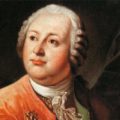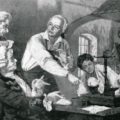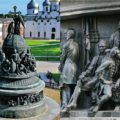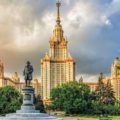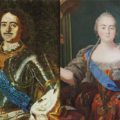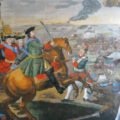- Портрет М.В.Ломоносова. Л.С.Миропольский, 1787 год
- Ломоносов в химической лаборатории за проверкой опытов Р.Бойля. Литография. Н.Г.Наговицын, 1957 год
- Памятник Тысячелетию России. М.В.Ломоносов. Великий Новгород, 1862 год
- Московский государственный университет имени М.В.Ломоносова собирает в своих стенах самых талантливых студентов России и ближнего зарубежья
Mikhail Lomonosov was Russia’s first scientist to receive worldwide recognition. A prominent reformist of science and education, a polymath, the founder of Moscow University, and the father of Russian poetry, he was a genius who lived in the right place at the right time.
Lomonosov used to be nicknamed a “natural talent” and a “Russian Leonardo da Vinci”, and now he can be called a great example of a self-made man — a person who made it from rags to riches, who come up in the world where social mobility was strictly limited by class system.
Mikhail Lomonosov was born on November 19, 1711 in a wealthy peasant family. Since childhood, he helped his father who had his own fishing crew in Arkhangelogorod Governorate, one of very few regions in Russia that had no serfdom. Lomonosov studied reading and writing from a clerk in his native Mishaninskaya village. He learned to read when he was already around 12–14 years of age, but he struggled with the lack of books. Mikhail’s mother died when the boy was only nine. Neither his father, a kind man but “brought up in extreme ignorance”, nor his stepmother (Lomonosov’s father was married twice after his first wife died) supported the boy’s passion for reading. It was especially difficult for the young man to establish relations with his second stepmother, a “malicious and envious” woman who mocked his interests and thought that his “scholarly” attitude was foolish. His father took her side and decided to marry his son in order to get the bookish nonsense out of his head.
Lomonosov realized that marriage would ruin his ambitions in science and education, so he pretended to be ill, hoping to postpone the wedding. And then he did something that was later called “an escape to Moscow”, a decision that changed the life of the 19-year-old village boy. He waited for the right moment and then, without saying a word to anyone, chased a fish train and persuaded to let him travel together with them. He did not, however, travel barefoot, as suggested by some sources, because the escape took place in December. Lomonosov brought along only some clothes and two books which he later called his “gateway to learning” — Grammar by Meletius Smotrytsky and Arithmetic by Leonty Magnitsky.
Lomonosov arrived in Moscow in January of 1731. He managed to enrol in the prestigious Slavic Greek Latin Academy, but he was forced to fake his documents and introduce himself as the son of a “nobleman from Kholmogory”. The road to knowledge was very thorny, because Mikhail attended classes together with “schoolchildren and young boys” when he himself was a grown-up lad of almost 20 years old, and he was regularly mocked for that. But the will to learn and incredible diligence helped him put all difficulties behind, and Lomonosov completed three classes of the Academy during his first year.
In 1734, the fraud was revealed, but Lomonosov was not punished but rather rewarded for his abilities and diligence — he was first sent to the Kyiv-Mohyla Academy, and a year later, in 1735, he became student of the Saint Petersburg Academy of Sciences. In 1736, Lomonosov was chosen for an internship in Germany, and since he did not speak a work of German, he learned it from scratch in just a few months. The 30-year-old student about four years abroad, and then decided to return home without permission. Once again, he avoided punishment and managed to defend two dissertations — in chemistry and physics, after which he was appointed adjunct to the physics class of the Academy of Sciences. At the age of 34, Lomonosov became professor of chemistry and received a civil service title that was equal to that of a nobleman.
- Мозаики работы М.В.Ломоносова
- «Полтавская баталия». Мозаика М. В. Ломоносова в здании Академии Наук. Санкт-Петербург. 1762—1764
Mikhail Lomonosov proved to be a genius not only in chemistry and physics. Alexander Pushkin called Lomonosov “our first university”, and his life and work are a clear testimony of how versatile and extraordinary a person he was. He succeeded both in natural sciences and humanities, and left a noted legacy in every field he worked in.
Project of the Moscow University, the only Russian university that ranks among world’s best in all rating systems, the revival of mosaic art in Russia, the reform of the Russian language and the use of iambus in verse — this is just a tiny portion of Lomonosov’s enormous legacy. He also discovered the Venus’ atmosphere, studied the origins of many minerals, created a number of optical devices, and laid the foundations of physical chemistry. Equally famous are his works in history and geography.
Over the past 310 years, the biography of “the Russian Leonardo da Vinci” has become surrounded by many legends (some of them made up by himself), and the general view of his activities and achievements ranged from appraisal to condemnation. But one thing is certain: since the death of Lomonosov in 1765, there has not been a person of such scale in Russia, and his contribution to the enlightenment and popularization of knowledge simply cannot be overestimated.
Alexandra Rubanovich

